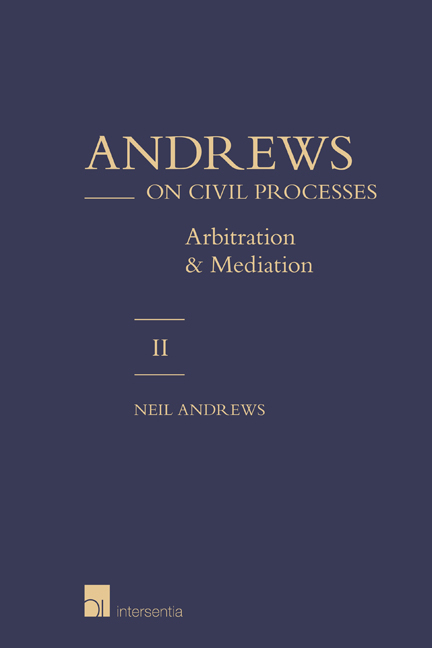Book contents
- Frontmatter
- Dedication
- CONTENTS VOLUME I
- Contents
- Table of Cases
- Table of Statutes
- Table of Statutory Instruments
- PART I MEDIATION
- PART II ARBITRATION
- Chapter 3 Commercial Arbitration: What Is It and Why Choose It?
- Chapter 4 The Major Principles of Arbitration and Litigation: A Comparison
- Chapter 5 Fundamental Features of English Arbitration
- Chapter 6 ‘The Seat’ and the Range of Relevant Laws
- Chapter 7 ‘Arbitrability’: Public Policy Limitations upon the Scope of Arbitration
- Chapter 8 A Confidential Process
- Chapter 9 Arbitration Agreements
- Chapter 10 Courts Giving Effect to Arbitration Agreements
- Chapter 11 Commencement of the Submission and Time Issues
- Chapter 12 The Tribunal's Appointment, Tenure and Immunity
- Chapter 13 Pre-Hearing Proceedings
- Chapter 14 The Hearing
- Chapter 15 Final Remedies, the Award, and Correction of the Award by the Tribunal
- Chapter 16 Fees, Expenses and Recoverable Costs
- Chapter 17 Arbitration Awards: Issues of Finality and Res Judicata
- Chapter 18 Challenges to English Arbitral Awards under English Law
- Chapter 19 English Enforcement of English Awards
- Chapter 20 Enforcement under the New York Convention (1958)
- PART III CONSUMER ADR
- Select Bibliography
- Index to Volumes I and II
Chapter 12 - The Tribunal's Appointment, Tenure and Immunity
from PART II - ARBITRATION
Published online by Cambridge University Press: 13 December 2017
- Frontmatter
- Dedication
- CONTENTS VOLUME I
- Contents
- Table of Cases
- Table of Statutes
- Table of Statutory Instruments
- PART I MEDIATION
- PART II ARBITRATION
- Chapter 3 Commercial Arbitration: What Is It and Why Choose It?
- Chapter 4 The Major Principles of Arbitration and Litigation: A Comparison
- Chapter 5 Fundamental Features of English Arbitration
- Chapter 6 ‘The Seat’ and the Range of Relevant Laws
- Chapter 7 ‘Arbitrability’: Public Policy Limitations upon the Scope of Arbitration
- Chapter 8 A Confidential Process
- Chapter 9 Arbitration Agreements
- Chapter 10 Courts Giving Effect to Arbitration Agreements
- Chapter 11 Commencement of the Submission and Time Issues
- Chapter 12 The Tribunal's Appointment, Tenure and Immunity
- Chapter 13 Pre-Hearing Proceedings
- Chapter 14 The Hearing
- Chapter 15 Final Remedies, the Award, and Correction of the Award by the Tribunal
- Chapter 16 Fees, Expenses and Recoverable Costs
- Chapter 17 Arbitration Awards: Issues of Finality and Res Judicata
- Chapter 18 Challenges to English Arbitral Awards under English Law
- Chapter 19 English Enforcement of English Awards
- Chapter 20 Enforcement under the New York Convention (1958)
- PART III CONSUMER ADR
- Select Bibliography
- Index to Volumes I and II
Summary
THE SLOW PROCESS OF APPOINTMENT
In his Cambridge lecture (2007), Stephen York, drawing upon his experience of English and international arbitration, suggested that steps should be taken to ensure prompt appointment of arbitrators. It is common for the selection process by party-appointment to take several months. This is a source of delay and expense. The position is unsatisfactory.
SOLE ARBITRATORS
In English arbitration law, the default size of the tribunal number is one arbitrator: ‘If there is not agreement as to the number of arbitrators, the tribunal shall consist of a sole arbitrator.’
The singleton arbitrator remains common in England (and the LCIA Rules reflect this). This arrangement was favoured by a majority of respondents to consultation on the 1996 Bill. The ICC Rules (2012) also state that, in the absence of contrary agreement, an arbitration agreement will be taken to involve appointment of a sole arbitrator (under those Rules), although this presumption can be rebutted if the ICC thinks that on the facts a three-member panel might be ‘appropriate’.
There are arguments in favour of using sole arbitrators. Such an arrangement is cheaper. It also works well if there are more than two parties. Another benefit is that the sole arbitrator is less inclined to strike a crude compromise between rival submissions and positions. But a three-arbitrator panel is divided by the wing-members’ opposite leanings.
However, there is the disadvantage that the sole arbitrator might be imposed on the parties by an institutional arbitration system if the parties have not nominated the arbitrator, or by the court (12.13).
The burden of making a decision in a heavy case can be considerable, and the sole decision-maker might not always be on top form, even if the individual's general reputation is strong. There is safety in numbers.
Furthermore, a three arbitrator panel allows each side to select their appointee, the third member being quite insulated from unilateral choice. The party-appointee system can foster (i) a sense that each party has a ‘judge of its choice’; (ii) and a further sense of ‘investment in the arbitration’; and (iii) that (certainly in an international context) the parties’ appointees can help resolve linguistic and cultural differences, and avoid misperceptions. But there can be fissures and inefficiencies created by having more than one arbitrator.
- Type
- Chapter
- Information
- Andrews on Civil ProcessesArbitration and Mediation, pp. 249 - 260Publisher: IntersentiaPrint publication year: 2013

